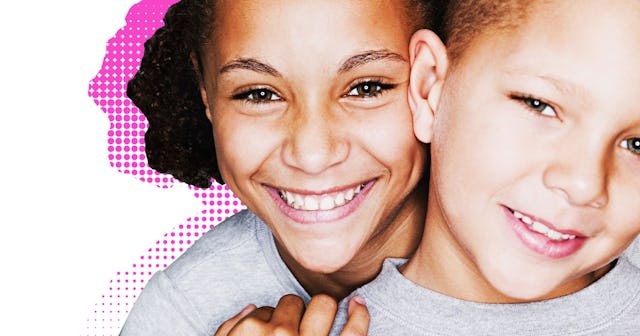We're Brother And Sister, Not 'Half Siblings'

“I just realized something,” my brother said as he sat across from me on the couch holding one of my kids.
“What’s that?” I asked, feeling slightly on edge since he’d had limited interaction with children and mine had been the test dummies over the last three years. He was at the birth for my oldest and arrived less than 12 hours after the second one was born. This was the longest yet of his bi-annual visits and we were both getting more comfortable with his caretaking.
“I just realized when other people talk about ‘half-siblings,’ they’re talking about us because we only share a mom.”
“Don’t ever say that again,” I said. “We’re not half anything. We’re siblings.”
I’d always hated that expression — half-sibling. I started thinking about the difference in dynamics between my children who shared a mother and father, and my brother and I who shared a mother. And I didn’t feel a difference. I saw the same annoyances. The same tattle-telling of one child on the other. But most importantly, I saw the same love.
Kelly Sikkema/Unsplash
I hope that sharing both parents doesn’t cause my kids to be the sort of label-obsessed kids that frustrated me for most of my childhood.
For me, family is everything. Almost to the point of fault.
My immediate family is more than my mother and brother. It’s inclusive of my aunts, a couple of uncles, and both of my maternal grandparents because they’ve all been a constant in my life. Growing up, some folks just didn’t understand that the way I saw my family was valid — especially because it often didn’t include mention of a father. That drove me nuts, but one of the most frustrating comments that I’d hear from other kids is referring to my younger brother as my “half-sibling” or suggesting that he’s not my “real brother” because we didn’t share two parents.
Through the years, the term “half-sibling” has been banished into the depths of the “don’t f*ckin’ say it” pit for me. It is completely off limits.
Sure, there are a handful of families who followed the traditional depiction of family and have held on to a “nuclear” format. But there are many more of us who exist in connection to those families and feel shamed or overlooked because we happened before – or significantly after – the nuclear bond was established.
Like most families in 2019, we deviate from the traditional image of a nuclear family. Just like most families, we have refused to let that deviation limit the connection or the love that we have for each other.
Many folks suggest that as “uterine siblings,” our bond is slightly stronger. To quote Bob’s Burgers, we’re in this “from the womb to the tomb.” But that doesn’t mean other families trying to put us into a more traditional box doesn’t hurt. And I’m not putting up with anyone who tries to downplay the bond I have with my brother just because we only share one parent.
Thankfully, over the last few years, more people have started talking about the problem with calling kids “half-siblings.” It’s not parents who determine the significance of the relationship between siblings; it’s the bond they’ve decided to create together. There’s nothing “half” about the way my brother has shaped my life. And each time others impose their views on what type of parent and siblinghood are legitimate, I feel the shock.
Jenna/Reshot
On the surface, I understand why people feel the need to label different types of siblings. Through the years, resources have been passed down through the father’s lineages, particularly in the European-style that rules the nation. It mattered who is connected to who in order to prove legitimacy. Half-siblings didn’t get benefits. However, that prioritization of legitimacy did not stop men from having multiple children in multiple places nor did it make the allocation of resources anymore simple. Instead, it stigmatized children.
Instead of making things easier, the labeling of sibling relationships just made it harder to establish bonds. Ironically, very few families have preserved that traditional nuclear structure that is uplifted as more valuable than others, but the terms have lived on.
Adoption, surrogacy, in vitro, and multiparent families aren’t something to be afraid of. They’re something to be embraced. If the environment is healthy for socio-emotional development, the rest shouldn’t matter.
bartholomew/Reshot
My brother and I were forced into connection because we share a mother. But our relationship has grown through the years because we’ve both put in effort towards keeping the communication lines open – even when we let each other down. And a love for harassing our mother is the glue that keeps us together.
We’ve forged that relationship on our own through growing up in the same household, having a wide range of sharing experiences, and the millions of laughs in fights that we’ve had over the last 21 years.
I love my younger brother with my whole heart. And there’s nothing anyone can say to change that.
So the next time you feel the need to assign the terms “half siblings” or “real siblings” to children who share one parent, I ask that you think long and hard. It’s impossible to know the relationship that siblings have without asking them. I don’t need anyone else’s permission to legitimize the relationship I have with my brother. We deserve the freedom to define that connection for ourselves.
This article was originally published on